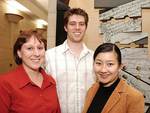Cerebral palsy researcher wins major prize
 Health Sciences Health Sciences
A young researcher from the University of Adelaide whose work has produced new insights into a common disability in children has been chosen as South Australia's Young Investigator of the Year for 2006. Dr Catherine Gibson, 26, has won $12,500 in prizes at the finals of the Young Investigator Award, held at the Adelaide Convention Centre last month. The award aims to promote excellence in science and communication among young researchers. The three finalists who present their research at the awards night are chosen based on the strength of their science; the finals are then decided on their ability to communicate that science to a general audience. Dr Gibson, a PhD graduate from the University's Discipline of Obstetrics & Gynaecology, based at the Women's & Children's Hospital, was named the Young Investigator of the Year by a panel of media judges. Her research focuses on the causes of cerebral palsy (CP) in children in the hopes of taking a step towards prevention or a cure. Currently, about one in every 400 children born in Australia suffers from CP. There is no screening method to detect it, no treatment or cure, and until recently the causes have been largely unknown. Dr Gibson's research delved into the potential multiple causes of brain damage in unborn children that lead to CP. These include: - blood clotting disorders, causing a stroke in the unborn child;
- viral infections; and
- variations in the immune system that lead to increased vulnerability to infection.
She tested blood samples from more than 400 babies with CP and more than 800 babies without the disorder, collected as part of the newborn screening program. She found that babies with CP have a twofold incidence of clotting disorders, and discovered that significantly more of the CP babies were exposed to viruses during pregnancy. Dr Gibson also found an increased risk of CP when the babies have abnormalities in their immune response, which makes them less able to fight infection. "This research has provided for the first time an understanding of some new potential causes of cerebral palsy," Dr Gibson said. "This may lead to strategies to help prevent this common neurological disability of childhood." The Young Investigator Award is an initiative of the Children, Youth and Women's Health Service (CYWHS) and the Faculty of Health Sciences at the University of Adelaide. As the winner, Dr Gibson was awarded the CYWHS Board Chair Award of $10,000, a prize of $1000 (untied) plus a Conference Prize of $1500 for attendance at a national or international conference in 2007. Story by David Ellis
|





